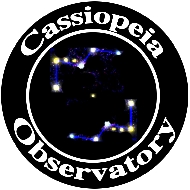Setting Sun, Crescent Moon, Earthshine, M23 Open Star Cluster
Posted: 27 June 2017
Saturday night, 24 June 2017, I was at Oracle State Park, the first and currently only IDA "International Dark Sky Park" in the Arizona State Parks system, for a "Live Music & Star Party" event. After the star party was over I returned home to cloudy skies.
Sunday, 25 June, was partly cloudy. Monday, 26 June, dawned clear but hazy. The forecast for the night was for clear skies, although some cloud buildups began appearing mid-day as our Monsoon Season begins to take hold.
|
Open: Monday, 26 June 2017, 1924 MST Temperature: 89°F |
Session: 1129 Conditions: Mostly clear |
Equipment Used:
12" f/8 LX600 w/StarLock
2" 24mm UWA eyepiece
2" 9mm 100° eyepiece
Camera:
D7200 DSLR
There was a nice storm to the East of the observatory when I opened the observatory:

1925 MST: AC OFF.
1937 MST: the setting Sun and a Yucca (from outside of the observatory):

1939 MST: sunset. 1942 MST: LX600 ON, StarLock OFF, High Precision OFF.
1944 MST: viewed Jupiter, 102X. The moons Ganymede and Callisto were visible. The shadow of Io in transit was visible. The moons Io and Europa were in transit but not visible.
1950 MST: viewed the crescent Moon, 102X. Nice view. Began setting up to image it. Mounted the D7200 DSLR at prime focus + focal reducer. 1958 MST: 1/320sec, ISO 800, White Balance Auto, exposure of the Moon:

2000 MST: Wi-Fi ON. Did some brief tests of the iOS app ScopeBoss using the iPhone 6s Plus. 2010 MST: Wi-Fi OFF. Reported the results to the developer.
2023 MST: Earthshine, 1/4sec, ISO 800, WB Auto:

Then removed the DSLR from the 12" telescope. Did some lunar observing, 102X.
2028 MST: viewed Jupiter, 102X and 271X. Io transit had just ended, but its shadow was still in transit. The moon Europa was also still in transit.
2041 MST: viewed Saturn, low in the southeast, 102X. Seeing was not good. Four moons were visible.
Viewed M23 (open star cluster), 102X.
2057 MST: Kissing Bug #1 terminated.
2106 MST: mounted the D7200 DSLR at prime focus + focal reducer, focused using the star Antares, and locked the primary mirror. Returned to M23.
2116 MST: StarLock ON. Took some images of M23. This is a StarLock autoguided, 30 seconds, ISO 1600, WB 3570K image of M23 (open cluster):

2121 MST: StarLock OFF. Ended imaging.
2122 MST: Kissing Bug #2 terminated.
2129 MST: viewed M23, 102X. Pretty.
2130 MST: LX600 OFF.
|
Close: Monday, 26 June 2017, 2143 MST Temperature: 83°F |
Session Length: 2h 19m Conditions: Mostly clear |
On the previous report I noted that I used a small socket wrench to tighten and loosen the primary mirror lock bolt when doing astrophotography with the 12" telescope and DSLR. This was more convenient than using my fingers, which is what I had been doing for the past year. Here is a photo of the wrench being used:

I recently mentioned smokey skies here in Oracle from the Frye Fire near Mt Graham Observatory. The fire came very close to the observatory complex and now there is this report that there may have been some Mt Graham Observatory damage.
Comments are welcome using Email. Twitter users can use the button below to tweet this report to your followers. Thanks.
Cassiopeia Observatory Home Page
Copyright ©2017 Michael L. Weasner / mweasner@me.com
URL = http://www.weasner.com/co/Reports/2017/06/27/index.html
